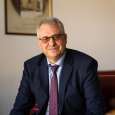Tinmar is a 100% Romanian business and a supplier of integrated utilities (electricity, oil and natural gas) to both industrial and residential customers. The company was founded in 2001 and is currently the largest private energy provider in Romania.
Tinmar Energy has grown to be one of the leading players in the Romanian energy market. What has been the strategy behind this successful development?
This was the first year we had to make sure that our strategy is aligned with two different customer needs, namely wholesale (industrial/corporate) and retail (household customers). The priority is therefore to make sure that our flexible approach to wholesale customers is perfectly aligned with the friendly relationship that the retail market demands. Our approach is to build long-term partnerships with a true correlation between market evolution and pricing, while we achieve a more cost-effective approach by grouping our services into our offer.
We truly hope that our offer meets all the needs of our customers and make their lives easier in a timely efficient manner so that they can truly appreciate Tinmar's Energy experience. Starting with March 2019 we also became an optional FUI. We are the Gas and Electricity Supplier with the lowest price both in the decentralized and regulated market, for households and corporate clients. In this direction, we are planning a large and important campaign for the autumn of 2019.
Your portfolio also includes renewable energy production capabilities. How do you evaluate the appetite for renewable energy among Romanian consumers? Do you have plans to expand your production capacity?
I truly believe the future is both green and clean. Several studies and reports have shown that green energy is gradually replacing conventional energy, due to people’s wish of progressing and protecting the planet. Green energy means an increased accountability and an increased quality of life, but also a challenging process of changing mentalities. Tinmar wishes to have an important say in this entire process.
For an increased sustainability, a great deal of the investments made for growing our company was directed, during the past years, towards the production of renewable energy in photovoltaic parks. We have already developed six solar parks with a total of 50 Mw installed power, located in some of the brightest areas of Romania. The plan going forward is to expand our production capacity by continuing to invest in the renewable energy sector.
What do you consider to be the main challenges about operating in the local business climate, also taking into account the regulatory framework? Do you have suggestions to overcome them?
Being a Romanian entrepreneur for a few decades has taught me an important lesson, namely to adapt our strategy to the local business climate and remain dynamic in order to succeed. At Tinmar we are always ready to adapt to a new regulatory framework and identify the best ways to cope with new demands. Some changes work to our advantage, whereas others are unnecessary or simply not useful. But as mentioned, the most important thing is to stay flexible and ready to adapt in any climate.
My suggestion would be towards less changes and more regulatory stability and predictability. Long term investments require a proper business climate if they are to succeed.
What are Tinmar’s key objectives over the coming two-three years and could you outline your vision regarding regional expansion?
Reliability, affordability and environmental responsibility could be the key words and our main objectives for the next years. In the B2B sector the priority will be to increase our clients portfolio and regain market share. When it comes to the residential sector, our goal is to reach one million consumers, by offering integrated services and green energy, besides other benefits that are included for those who choose us as their utility provider, both electricity and gas.
The regional vision includes plans to continue expansion and development in countries where we are already present. As mentioned, we also plan to continue investment in the renewable sector (primarily solar) and increase our capacity production from 50 MWh to 100 MWh.






